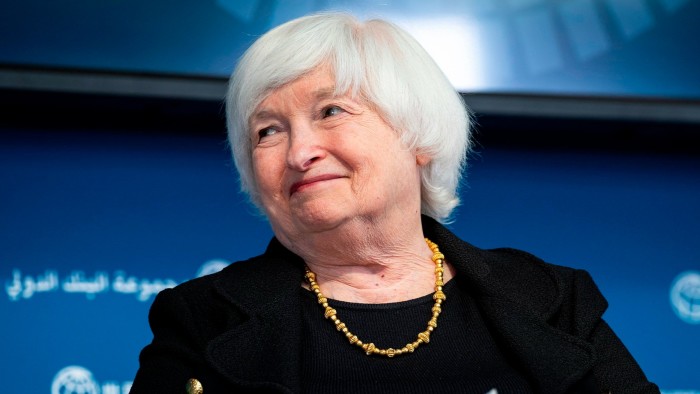Unlock the Editor’s Digest for free
Roula Khalaf, Editor of the FT, selects her favourite stories in this weekly newsletter.
Imagine an experiment in which the (otherwise identical) views of senior male or senior female economists are presented to the public. Which would you expect to be more persuasive? I think my first guess would be “neither”, in line with former British politician Michael Gove’s famous pronouncement during the Brexit campaign that people “have had enough of experts”. Failing that, my next guess would be “the men”, based on research which suggests there is often still an “authority gap” in the way people perceive men and women. But when economists Hans Henrik Sievertsen and Sarah Smith performed this experiment in real life, the results proved me wrong on both counts.
Sievertsen and Smith showed about 3,000 members of the public in the US a series of statements about economic issues, from financial regulation to windfall taxes and AI. They let them know whether a real-life named economist strongly agreed, agreed, was uncertain, disagreed, or strongly disagreed with that statement. Then they asked the person for their own opinion. The expert opinions were drawn from a panel run by the University of Chicago, which regularly elicits the views of leading academic economists at top US universities on various topics.
The study found that public opinion on these issues was influenced by the views of the economists. Even more interestingly, the female economists were more influential than the male ones. The additional effect of seeing an opinion expressed by a female expert was 20 per cent greater than the effect of seeing the same opinion expressed by a male expert.
Why might that be? In search of answers, the researchers reran the experiment, but this time they removed information on the expert’s credentials (their professor title and the name of their university). When the only thing the public knew was that they were “economists”, the gender gap disappeared: the men and women were equally persuasive with the public.
For Sievertsen and Smith, the best explanation for their findings is that members of the public are making an assumption of their own: that to have become professors at prestigious universities in a male-dominated field, the women must be more impressive than the men. “Put simply, visibly successful women, if they have “made it” in stereotypically male domains, may be perceived as better than their male counterparts,” they wrote in their paper.
Some other studies have found a similar phenomenon. In one experiment, academics ran some game-based tests in Ethiopia to study whether people followed advice differently when they were randomly assigned a male or a female leader (who were otherwise identical). That experiment found that people were less likely to follow a female leader’s guidance. But when the researchers told a subset of people that their leader was of high ability, people became more likely to follow the guidance of the “high ability” female than the “high ability” male.
Are people correct to assume that a woman who has succeeded in a male-dominated field must be better than their male counterparts? Or is this very unfair to men? “I wouldn’t say we know that women have to be better” to make it to the top in economics, Smith told me. “But we certainly know there is stereotyped discrimination against women further down the process.”
In one study, for example, machine learning techniques were used to study the audio recordings of more than 1,700 economic seminars. The analysis found that female speakers were interrupted more frequently and earlier than male speakers and that the extra interruptions largely stemmed from female, rather than male, audience members. The study also found men were more likely to make comments rather than ask questions of female presenters.
Another study found that men were given tenure at roughly the same rate regardless of whether they co-authored research papers or wrote them alone, whereas women became less likely to receive tenure the more they co-authored papers.
Whether or not members of the public are correct to assume the bar is higher for women in certain male-dominated professions, it is useful to know that is the assumption they may be making.
If, say, you are a senior woman in a male-dominated field and you’re about to do something public-facing, it suggests you should silence the inner voice which whispers that the audience might dismiss or discount your expertise. In fact, they might well be thinking: “She must be seriously impressive to have got to where she is. I’m going to listen to what she has to say.”
Read the full article here




